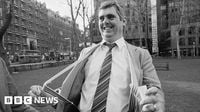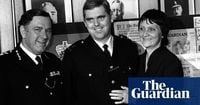Trevor Lock, the policeman who was taken hostage during the Iranian embassy siege in London in 1980, has died at the age of 85, as confirmed by his daughter. Lock was one of 26 hostages held captive when six gunmen stormed the embassy on April 30, 1980. The assailants, part of a dissident Iranian group opposed to Ayatollah Khomeini, demanded the release of 91 political prisoners and an aircraft to facilitate their escape from the UK.
Over the course of a tense six-day standoff, Lock played a crucial role in the negotiations, relaying messages between the gunmen and police negotiators, utilizing an open window and a telephone. Despite being held at gunpoint, he remained calm, providing reassurance to his fellow captives. His bravery was later recognized with the George Medal, an honor awarded for outstanding acts of courage.
On the sixth day of the hostage crisis, the situation escalated dramatically when the gunmen killed Iranian press attaché Abbas Lavasani and displayed his body outside the embassy. This act prompted the British government, led by Prime Minister Margaret Thatcher, to authorize the Special Air Service (SAS) to storm the building. More than 30 masked troops executed the raid on May 5, 1980, which was broadcast live across three television channels.
During the chaotic assault, Lock confronted the leader of the gunmen, known as Salim, tackling him and thereby saving the life of an SAS soldier. The raid resulted in the tragic loss of one hostage and left two others wounded in the crossfire. Ultimately, five of the six gunmen were killed, while the lone survivor was sentenced to 28 years in prison.
Brian Booth, acting deputy national chair of the Police Federation, praised Lock’s extraordinary bravery, stating, “PC Lock’s extraordinary bravery during the Iranian embassy siege in 1980 exemplifies the highest standards of policing. Despite being taken hostage, he remained resolute, calming fellow captives and resisting his armed captors.” Booth highlighted that Lock’s courage and resourcefulness under pressure not only saved lives but also set a standard for police officers across the nation.
Lock was a member of the Metropolitan Police’s diplomatic protection squad, tasked with safeguarding the embassy in Kensington. On the day of the siege, he was drinking coffee with the embassy concierge, Abbas Fallahi, when the attack commenced. Lock later recounted the moment when he was struck by flying glass during the initial assault, mistaking it for a gunshot wound. In a 2002 interview, he vividly described the experience: “I remember a curtain of red coming down and immense pain in my eyes and face. I thought I’d been shot.”
The hostage situation drew significant media attention, with the public captivated by the unfolding drama. The SAS operation, which took place on a bank holiday, resulted in the successful rescue of the remaining hostages, who emerged from the embassy to the relief of their families and friends.
Lock’s legacy extends beyond his heroics during the siege. He was remembered as a dedicated officer who shunned the spotlight yet inspired many with his selflessness and resilience throughout his career. “Though he shunned the spotlight, his legacy continues to inspire officers across the nation,” Booth remarked, emphasizing the impact Lock had on his colleagues and the wider community.
In the aftermath of the siege, the incident raised questions about police response to terrorism and hostage situations in the UK. The successful resolution of the Iranian embassy siege set a precedent for future operations and highlighted the critical role of special forces in such crises. Lock's actions during the event have been analyzed in various accounts, with author Ben Macintyre describing him as “the policeman who discovered accidental courage without looking for it, wanting it or knowing what it was.”
Trevor Lock's passing marks the end of an era for those who remember the harrowing events of 1980. His bravery and quick thinking in the face of danger not only saved lives but also left a lasting impression on the history of policing in Britain. As tributes pour in from former colleagues and members of the public, it is clear that his service and sacrifice will not be forgotten.
Lock’s family and friends are mourning the loss of a man who embodied the spirit of courage and dedication. His contributions to public safety and his heroic actions during one of the most dramatic hostage situations in British history will continue to resonate for years to come.





